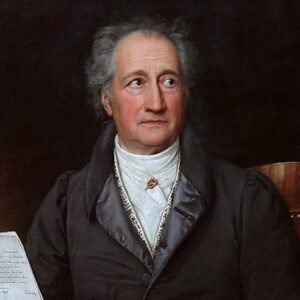It is startling and more than a little amusing to finally realize, or to have pointed out to you, as happened to me, that the word ‘dunce’, a not exactly au courant but certainly still, I think, recognizable word that basically means stupid, one who wears the dunce cap, that this word is, actually, a shortened form of saying that a person is like Duns Scotus, the medieval scholastic philosopher and member of the Franciscan order. Calling someone a dunce is calling them a Duns, a Scotist. Why one of the great minds of Western philosophy and theology would have become synonymous with stupidity is not immediately apparent. Something must have gone awry here.
In fact, the trajectory of word and meaning is not so hard to understand once one parses it out. Medieval Scholasticism, of which Duns Scotus was a great luminary, fell out of favor. Scotus’ once admired feats of logical daring began to look empty and pointless. Add to that the Protestant attack on the doctrines of the Church that Scotus did so much to defend intellectually and you get to the point where a person who was once called doctor subtilis, The Subtle Doctor, is now openly referred to as a dumb ass.
The question, though, and this is something I am still in the process of thinking through and which would require, I fear, rather too much reading of abstruse and difficult to love medieval works of philosophy, a task to which I devoted some time as a younger person studying philosophy while, at the same time, trying to bone up my medieval Latin, to varying degrees of success I should add, though I did get through quite a bit of Scotus’ work unraveling a couple of the trickier problems in what Aristotle means, exactly, by the words ‘being’ and ‘essence’. This was a Latin and medieval philosophy reading group that I attended one year in a windowless room. The group was led by a brilliant and often deeply, frustratingly opaque person named Johannes Fritsche, who became a kind of mentor of mine for a time, mostly because he could easily spend one, two, or six hours looking at a couple of sentences by Aristotle, Duns Scotus, Zabarella, or Heidegger (whom he loathed with a constant, simmering rage) and teasing out the tiniest nuances therefrom. These nuances, in the hands of Fritsche, became portentous clues as to the real purpose and drive of all metaphysical thought, thought which Fritsche was highly suspicious of on one hand, and deeply addicted to on the other.
He was, now that I come to think of it, quite the doctor subtilis himself and I am realizing in the process of writing that I have set out, not entirely meaning to, I have ventured forth really to pay some tribute to Johannes Fritsche, a person who taught me quite a bit about subtlety, which is a skill, a mood, an approach, a ‘way of being’ that does not come at all naturally to me and therefore I am, assuredly, a terrible student and in no ways a good example of the carefulness and patience by which persons like Johannes Fritsche and, for that matter, Duns Scotus went about their craft. Johannes Fritsche died last year, I should also mention. So this is a kind of eulogy. Yes, this is a eulogy.
The question I was trying to get to a little earlier was whether Duns Scotus was himself, ironically, rather less committed to the procedures of Scholastic philosophy than he seemed. By this I mean that there are at least two ways to do Scholastic philosophy though, I am sure, there are really many more than two ways. But we can establish at least these two possibilities. You do Scholastic philosophy in good faith, because you basically believe that it can deliver the goods, as it were, or you do it in bad faith, you do it in order to show what it can’t do. You run it into the ground. It’s possible that Duns Scotus was more or less of the latter sort. He was playing Scholastic philosophy against itself. To some degree. He was using the tools of Scholastic philosophy in order, in a sense, to break them, to destroy those tools. That’s probably too strong. But it was a tricky business, I think, what Scotus was up to.
Take the concept of haecceity, for instance, which must be one of the more unwieldy sort of words (how do you pronounce it?) in the history of philosophy and which is one of Scotus’ great gifts to us, though actually his students, the Dunses, came up with the word as their best shot at naming an idea that Scotus had elaborated in his philosophical treatises. Haecceity comes from the Latin word haec, which means ‘this’. So haecceity is best translated as ‘thisness’. Duns Scotus was trying to isolate the particular thisness that makes each thing a ‘this’ and therefore completely and totally unique. This is a rather perverse thing for a metaphysician to do. To focus on thisness is, in the mood of it, to turn philosophy on its head. It’s to say that the strange, unaccountable, irreducible quality of all things, that which makes each thing of creation just what it is, that this is the central and unsolvable mystery. The only way you are going to come into contact with thisness, and thus to know and to relate to anyone else, anything else, is to pay attention to that thing, that person, that object in its ineluctable, weird, unique specialness. That’s not really the sort of thing that a philosopher, especially a medieval Scholastic philosopher, is supposed to say. That’s the sort of thing a poet or a mystic says (Gerard Manley Hopkins, for instance, loved Scotus). But Scotus said it. He just said it with the words of Scholastic philosophy, so it sounds like a bit of philosophy when, in fact, it is a thought by which philosophy collapses in on itself. Or maybe truly becomes itself, finally. You could say that as well, maybe.
Why do philosophy at all then? That’s a good question. My mentor and, later, friend, though a friend whom I always called Professor Fritsche in order to maintain a hierarchy that I found real and important, the importance of always being a student to him and the importance that he would always be a master to me, this man Johannes Fritsche, whom I respected and loved in his own haecceity that included his slate grey suits and very German spectacles but always with the New Balance running shoes because he had bad feet. This man who spoke so softly that many people dropped his classes simply because they couldn’t hear him and many of the others dropped the classes because even when they could hear him they weren’t sure what he was talking about, this man was fiercely committed to dismantling metaphysics one sentence at a time. He was in no rush. He was taking his time with it. Like a long goodbye. Like the lingering light after the sun has set. Because he also loved metaphysics. He loved it and he knew he had to take it apart. He would shuffle back and forth in his awkward way at the front of the class drawing circles occasionally on the blackboard usually somewhere near the words ‘to ti en enai’ the ancient Greek words that mean, roughly, ‘the what it is [was] to be’. He was obsessed with that phrase. The key to everything that philosophy has been trying to think and failing to think and messing up and wrangling with, all of it could be pulled from those words. But very slowly and over a lifetime.
He was, I’m just coming to realize, Professor Fritsche was a dunce. Misunderstood, underappreciated, frequently baffling to his colleagues, stubborn, persistent, but always with an underlying gentleness that carried him through, carried through this project of excavating the sentences of metaphysics and laying them bare. That was his task, that was his haecceity. And no one really cared and then he died. But I cared. I want to say that at least. And I want to say, to no one in particular, that I finally get what you were doing, Professor Fritsche, that you were always, like the Dunses, committed to making sure that philosophy loses, that it adjudicates nothing, and that this was your own secret act of faith, your own backdoor way of protecting the world in the way that you could, with the tools that you had at your disposal, with your unique thisness that was, like all haecceities, in the end, in the last instance, a great expression of love.
Morgan Meis has a PhD in Philosophy and is a founding member of Flux Factory, an arts collective in New York. He has written for n+1, The Believer, Harper’s Magazine, The Virginia Quarterly Review and is a contributor at The New Yorker. He won the Whiting Award for non-fiction in 2013. Morgan is also an editor at 3 Quarks Daily, and a winner of a Creative Capital | Warhol Foundation Arts Writers grant. A book of Morgan’s selected essays can be found here. His new book from Slant is The Drunken Silenus. He can be reached at morganmeis@gmail.com.





